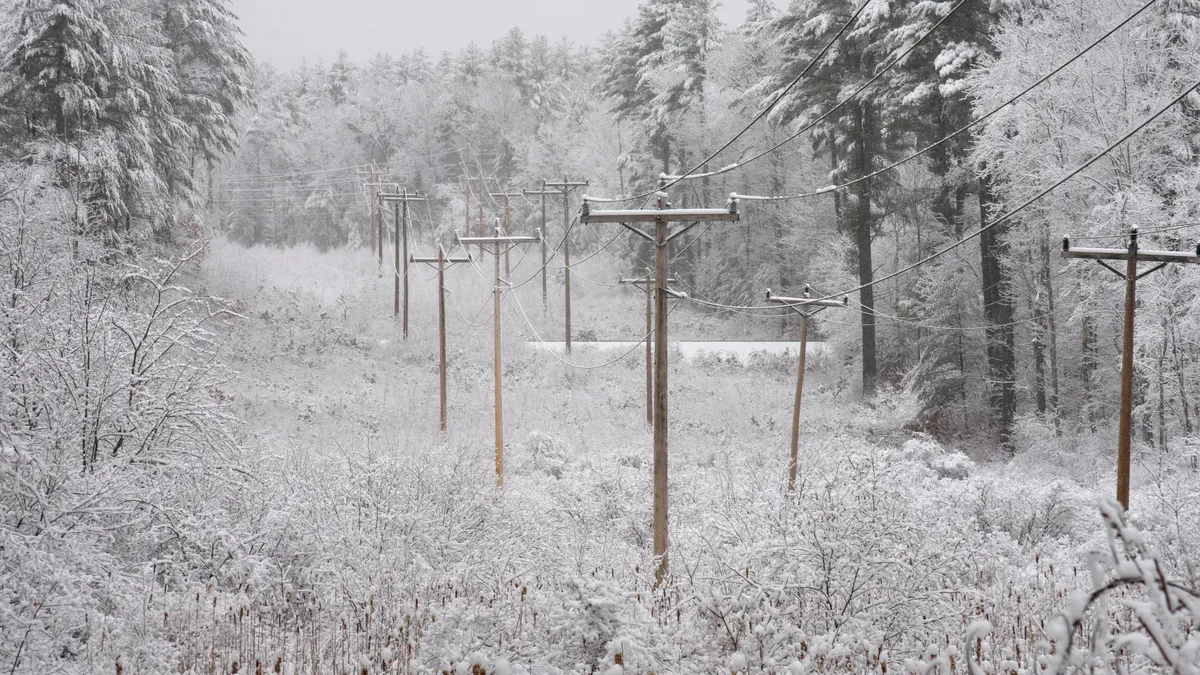Dive Brief:
- A large portion of the North American electric grid could face energy shortfalls in extreme weather conditions this winter, according to a Thursday assessment from the North American Electric Reliability Corp.
- The situation is “unprecedented,” John Moura, NERC’s director of reliability assessment and system performance analysis, said in a call with media to discuss the report. “The system hasn't been stressed in this manner in the past, and probably more importantly, it hasn't been as widespread.”
- The grid has a sufficient supply of capacity resources under normal winter conditions, said NERC officials. But portions of Texas, the Southeast, Midwest, Northeast and other areas risk blackouts under challenging conditions, which could include unexpected generator outages as a result of extreme temperatures.
Dive Insight:
NERC has witnessed a “progression of risk” over the past several years, said Moura, but this year is different.
There is “not so much indication of a successful outcome,” he said. “There isn't a lot of dispatchable generation on the horizon, there aren’t miles of new interstate pipelines being developed to support our natural gas infrastructure. We don't see robust, dual-fuel, resilient fuel systems. So there are factors that are pushing you further into that risky territory.”
NERC said its report finds Texas, North Carolina and South Carolina, and the southern parts of the Midcontinent Independent System Operator territory are at risk of a “significant number of generator forced outages in extreme and prolonged cold temperatures.”
The power and fuel infrastructure in those regions was not designed for extreme cold weather and is vulnerable, according to the report.
Texas regulators have enacted several rules to improve generator reliability in cold weather, and NERC noted these efforts. Those new requirements “should reduce the impacts of a severe weather event,” said Mark Olson, NERC’s manager of reliability assessment, both by keeping infrastructure operating in frigid temperatures and through market changes to “improve the fuel availability for natural gas-fired generators.”
MISO has seen its reserve margins fall more than 5% since last year, as 4.2 GW of nuclear and coal-fired generation have been retired, NERC warned.
“We need to pause coal plant closures until NERC assures us that the electricity grid is as reliable as it needs to be to withstand extreme weather during both winter and summer,” said Michelle Bloodworth, president and CEO of America’s Power, which represents the coal industry.
NERC’s report also points to limited gas transportation capacity in New England, where the fuel is used for residential heating. The limited capacity could leave generators short, it said.
“Potential constraints on the fuel delivery systems, coupled with the limited inventory of liquid fuels, may exacerbate the risks for fuel-based generator outages and output reductions that result in energy emergencies during extreme weather,” said NERC.
Utilities say they are working to ensure reliable service this winter, but operating conditions are challenging.
“The war in Ukraine, supply chain constraints, and limited natural gas pipeline capacity in some regions made for a summer of challenges, and many of these issues remain,” Edison Electric Institute Senior Vice President for Security and Preparedness Scott Aaronson said in an email. The group represents investor-owned utilities.
“Strong industry-government coordination is crucial as we continue to work together to ensure we have sufficient energy resources to meet the needs of our customers,” Aaronson said.
National Rural Electric Cooperative Association CEO Jim Matheson called NERC’s report a “clear and constant warning about the nationwide consequences of continuing a haphazard energy transition.”
“This assessment paints a stark and disheartening picture of the reliability challenges facing much of the United States this winter,” Matheson said. “It doesn’t have to be this way. But absent a shift in state and federal energy policy, this is a reality we will face for years to come.”















